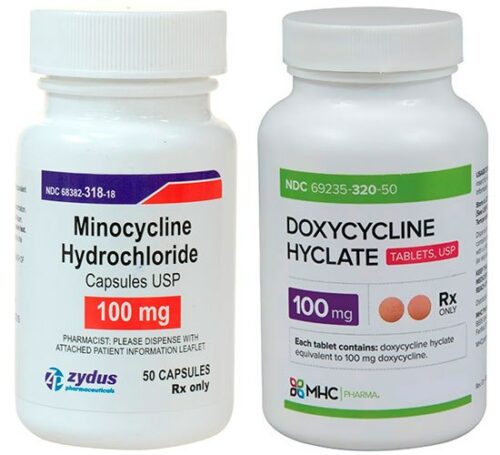Thanks to another reader for sharing expertise that might help fellow readers. Here, Stephen Replogle, D.O., discusses new ‘old’ treatment for arthritis.
As a physician of 30 years, I am convinced that about 70% of arthritis cases are caused by a low grade infection. Lyme arthritis certainly is one subset of the infections that can cause arthritis, but there are many other infectious agents that do.
In clinical practice, I observed about a 70% response rate to treating classic arthritis with the tetracycline antibiotics, doxycycline or minocycline. I would treat a month at a time, and treat until the arthritis was 80% or more improved. Then the antibiotic can be stopped, and the arthritic stiffness and aches normally remain in remission.

An argument that applies to teenage acne as well as rheumatoid arthritis.
There is a fringe group of rheumatologists who have been advocating this for over 50 years. Called the “Road Back Foundation” it was founded in 1993 by grateful patients of Dr. Thomas McPherson Brown as a non-profit, charitable organization dedicated to keeping his legacy alive by providing information to patients, practitioners and the general public about Antibiotic Protocols (AP) for the treatment of rheumatic diseases.
The website states: ‘Rheumatoid arthritis, scleroderma, juvenile rheumatoid arthritis (JRA, sometimes referred to as juvenile idiopathic arthritis or JIA), lupus, mixed and undifferentiated connective tissue diseases, the spondyloarthropathies, polymyositis and dermatomyositis, fibromyalgia, Reiter’s and associated syndromes such as Raynaud’s and secondary Sjögren’s have all responded well to AP treatment.’
While they advocate low dose minocycline, long term, I prefer full dose doxycycline shorter term, says Stephen.
Their web site does list treating physicians, but any doctor can do this. All other treatments are life-long, this is to resolve the cause.
Obviously, talk to your physician before following any other medical protocol. We are not offering medical advice here, just something to discuss with your own doctor should you suffer from a rheumatoid disease.

